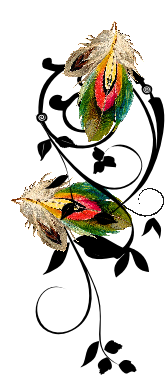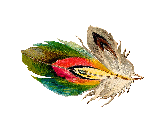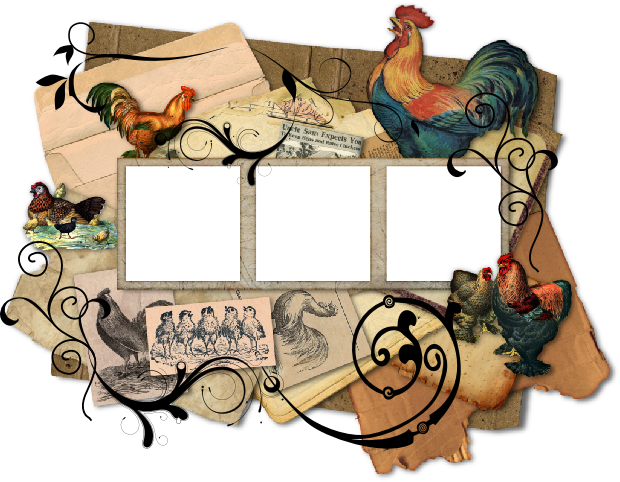Again, my site is aimed at the person who keeps chickens for pets and eggs--not the
rancher. If your disposal method of choice for dead birds is the dumpster, no need
to read any further. But chickens are quickly gaining acknowledgement and favor as
pet animals, even making the leap to becoming house pets. Most dog owners would never
toss their dead family dog in the dumpster, and that's the way we feel about our
chickens--they are our family pets who just happen to give eggs, fertilize the yard
and do darned fine bug control. :)
Sometimes the final step of euthanasia is the kindest, best and only thing we can
do for our feathered friends. This is never an easy choice and being human and attached
to your animals, you'll probably agonize for a long time afterward over whether you
did the right thing or not. Once in a while the choice will be clear-cut and obvious,
but life is usually messier than that and there will be more shades of gray. You'll
waffle back and forth and agonize over your decision–you wouldn't be human if you
didn't. You are to be commended for stepping up, being responsible, making a decision
and doing what needs to be done in the best interest of your animal. That is the
mark of a decent, true human being and good animal husbandry.
I'm going to discuss here briefly and matter-of-factly the various ways to euthanize
birds, but there will be no graphic explanations or photos, no debate. I'm also including
several links to different pages that discuss euthanasia techniques--some are worded
kindly, others are more blunt and may offend--but I'm including them here because
they offer valuable information that you may need at 7PM on a Sunday night when the
vet has gone home for the day and you need to take action NOW. None of these particular
webpages has any graphic images.
It's generally agreed that the cervical dislocation method is the quickest and most
humane method, but it does take a certain amount of nerve, skill and steady hands--and
some people simply cannot bring themselves to use this very personal method, or they
fear they will do it incorrectly and cause further suffering. I simply offer the
information here in case you can't get your animal to a vet for euthanasia there.
The only difference in putting down adults versus chicks is really the size of the
animal and the degree of difficulty in restraining a large, adult bird.
Whatever method you use, do take a moment to hold your friend and soothe it by speaking
softly, giving it some pets and maybe some little favorite food tidbits. Take the
opportunity to say thank you and goodbye. You will be more at peace with yourself
afterwards.
Cervical dislocation:
URL: http://www.chickenfarmers.ca/wp-content/uploads/2014/05/CFC-Euthanasia-Guidelines.pdf
URL: http://nwco.net/0531-stepthreelethaltoolsandtechniques/5-5-0-CervicalDislocation.asp
Good page on how to euthanize and descriptions of various methods, written for use
on House Sparrows (a pest in many areas) but certainly useful for chickens as well:
http://www.sialis.org/hospdispatch.htm#how
A page describing the starter fluid method:
http://www.purplemartin.org/forumarchives/archive/Humane.htm
I'm not going to make any judgements as to right or wrong, and don't allow other
people to second-guess you when you have to decide what to do–no one knows your pet
better than you. Also, non-chicken people can be REALLY less than kind regarding
your grief over losing one of your birds--to most people who have never interacted
with them, it's 'just a chicken'. If they act bewildered or lose their temper over
your strong emotions, just try to remember that to most people a chicken is a food
product, seen wrapped in plastic in the grocer's cooler. They can no more identify
with having one as a pet as they can having an insect as a pet. To them chickens
are simple animals with no personality or affection. Chicken people know better,
and there are plenty of people online who can and do sympathize with your loss. You
can search online for various sites for help with pet loss, here are a couple especially
good ones I've found--
Good site on pet loss and how to deal with it here:
URL: http://www.petvets.com/pet-loss-articles.html
Good article on pet loss when others find it hard to identify with you, here:
URL: http://www.exoticpetvet.net/primate/grief.html
Just realize that you are not alone in your grief, and it's not at all unusual. What
is sometimes VERY hard are additional guilt feelings--knowing that you could have
done more...you should have known better...you should have realized something was
wrong...you should have acted sooner...anything like that. Sometimes yes, it's true
and it's a hard pill to have to swallow. In those times you can take some comfort
in using the experience as a life lesson so that it doesn't happen again, or sharing
your experiences with others to help them avoid falling into the same trap. Other
times the death was accidental or unavoidable, or you truly did everything you could.
Sometimes the bird was already gone when you discovered it, and there was nothing
to do.
And yes, chickens do mourn for dead flockmates.
Your flock also needs help in mourning the loss of a flockmate. Birds, and chickens
especially, are flock animals and are very bonded to each other (and you--more later
on why you going to Hawaii for a weeks' vacation equals you DEAD to your chickens).
When one of them dies, especially if the death occurred out of their sight, they
need you to help them understand that Henrietta won't be coming back. In my own experience,
I've found that when one of my birds dies (or is removed from the flock for a time
due to illness or injury and so is out of sight) the others become saddened, bewildered
and genuinely grieve for the missing bird. They wander about, searching, crying out
plaintively and acting obviously stressed. They will come up to you and plainly show
that they want YOU, as Chicken God, to fix it and make things right again. If you
go out and try to comfort them, they will be more clingy than usual and require more
comforting. Chickens need closure just like you and I do.
I've discovered that the best way to deal with a dead flockmate is to show it to
the flock so that they can understand what has happened. When one of our pets dies,
we prefer to bury them in the back yard, so the first thing that happens is that
the grave is dug. The small amount of ceremony also helps our young daughter understand
that the living and dying process is a natural part of life. We have had some of
our birds for so many years (8 to 12 years) that some of them know what this type
of hole-digging means and they will either stand nearby quietly or wander nearby
and cry out a bit. After we have dug our hole and gathered some garden flowers to
accompany our friend, we bring out the body of the bird and lay it gently next to
the grave. Then we step back and give the flock the opportunity to come up to their
friend and see that it has passed on. After a moment we place the body and the flowers
into the grave, say our goodbyes and fill in the hole. We have found that our flock
is much less stressed, do less searching for the lost flockmate and cry out less
when we have followed this procedure. Some people might think it a little 'New Age'
to include a chickens' fellow feathered friends in graveside goodbyes, but the difference
we have noticed has proved to us, anyway, that it really does work–it helps us AND
our surviving chickens.
The only time this process did not help substantially was when we lost two birds
within 48 hours of each other--first our Head Hen (Wild Child, age 10 years) and
unexpectedly, less than 48 hours later, our Head Roo (Jack, age 9 years). This proved
so upsetting to the flock dynamic that it literally took months for them to recover
and cease looking so lost. For a long time they required more attention and petting
from us, and while we do finally have a new Head Roo (Phoenix, Jack's son), filling
the Head Hen position took considerably longer–three hens shared the job for months
until one emerged as the new Head Hen. It just goes to show how strong a bond a flock
has and how important each member is.



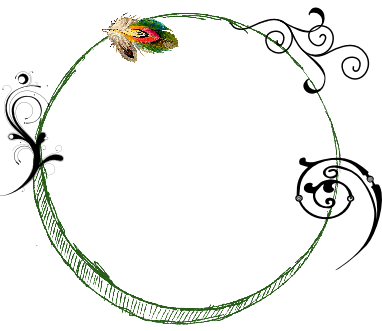

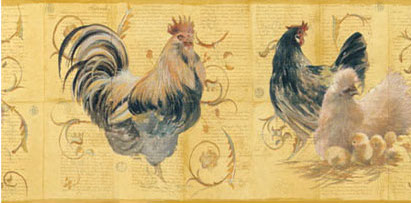
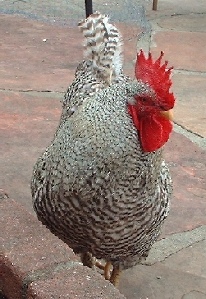 >
>

